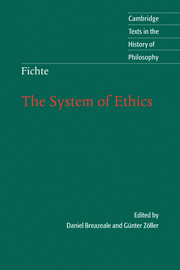Book contents
- Frontmatter
- Contents
- Acknowledgments
- Introduction
- Chronology
- Further reading
- Note on the text and translation
- List of abbreviations
- The System of Ethics
- Table of contents
- Introduction
- Part I Deduction of the principle of morality
- Part II Deduction of the reality and applicability of the principle of morality
- Part III Systematic application of the principle of morality, or ethics in the narrower sense
- Glossary
- Index
- Cambridge texts in the history of philosophy
Part I - Deduction of the principle of morality
Published online by Cambridge University Press: 05 June 2012
- Frontmatter
- Contents
- Acknowledgments
- Introduction
- Chronology
- Further reading
- Note on the text and translation
- List of abbreviations
- The System of Ethics
- Table of contents
- Introduction
- Part I Deduction of the principle of morality
- Part II Deduction of the reality and applicability of the principle of morality
- Part III Systematic application of the principle of morality, or ethics in the narrower sense
- Glossary
- Index
- Cambridge texts in the history of philosophy
Summary
Preliminary remark concerning this deduction
It is claimed that the human mind finds itself to be absolutely compelled to do certain things entirely apart from any extrinsic ends, but purely and simply for the sake of doing them, and to refrain from doing other things, equally independently of any extrinsic ends, purely and simply for the sake of leaving them undone. Insofar as such a compulsion [Zunötigung] is supposed to manifest itself necessarily in human beings just as surely as they are human beings, this constitutes what is called the moral or ethical nature of human beings as such.
Human cognition can relate to this, its moral nature in a twofold manner. On the one hand, a human being may find the above-mentioned inner compulsion through self-observation, as a fact – and then it is of course assumed that this fact can certainly be found through attentive self-observation. In this case, one sticks with the sheer fact as such and is satisfied to have found that this is simply how things are, without asking how and on the basis of what grounds they become what they are. One might even decide, freely and from one's own inclination, to attach unconditional faith to this inner compulsion: i.e., one might decide actually to think that one's highest vocation is what is represented to one as such by this inner compulsion and to act unfailingly in accordance with this faith.
- Type
- Chapter
- Information
- Fichte: The System of Ethics , pp. 19 - 64Publisher: Cambridge University PressPrint publication year: 2005

